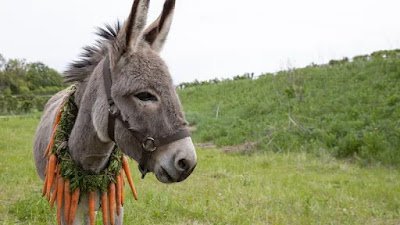Whether or not you buy into EO as fiction will depend upon your readiness to project emotion onto a creature who, by his or her very nature, cannot act in a way, say, even Gerard Butler can act. (Favourable responses to the film are as the "aww"s occasioned in petting zoos.) As allegory for Man's Suffering, EO can't work because, as wasn't the case with its inspiration, its construction and execution keep getting in your face and in the way - Skolimowski's plainly enjoying himself too much, in short. (Bresson never thought of blaring death metal over the ride into oblivion, for better or worse.) Only auteurist noblesse oblige can account for the film's madly pinballing tone: why it resembles a kids' film until the scene where somebody gets their throat slashed, and then sends on Isabelle Huppert for an utterly baffling cameo. For a while, though, the film proves diverting enough as one of the Polish cinema's documentary-adjacent texts: non-fiction, accompanying a donkey or six as they have a jolly day out in artfully shot and lit locations. In this reading, EO would be as the cow in Andrea Arnold's Cow, given greater freedom to roam - from inner city to Poland's rural outreaches - before arriving at much the same destination. EO is never less than visually dynamic: one minute, Skolimowski's ziplining his camera over a river, the next he's falling in synch with a churning wind turbine. That makes it move, yes, but nothing here comes close to the austerely involving and affecting Bresson film. EO makes quite a good advert for donkeys - steadfast, docile, a handy way of getting from A to B, and Skolimowski pays his weary four-legged trooper-in-chief the compliment of shooting him like a 7 Series BMW. But does a dotty footnote like this deserve an Oscar nod ahead of Decision to Leave? One again concludes the Academy is an ass.
EO opens in selected cinemas from Friday.

No comments:
Post a Comment